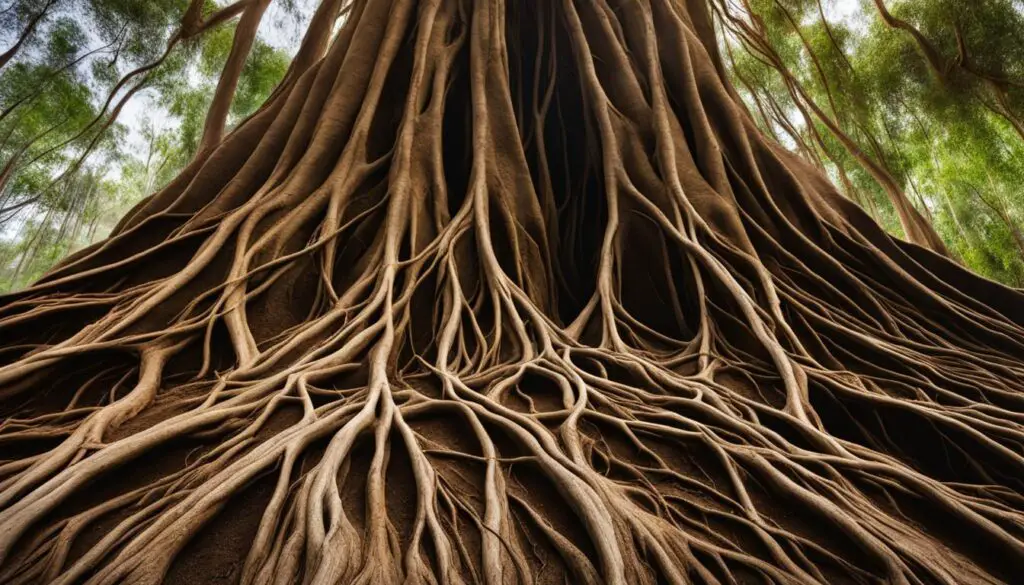Eucalyptus trees are known for their majestic beauty and unique characteristics, but have you ever wondered where they get their water from? In this article, we will delve into the fascinating world of eucalyptus tree hydration and explore the secrets behind their remarkable ability to thrive in various environmental conditions.
Key Takeaways:
- Eucalyptus trees can extract water from deep within the soil, allowing them to survive in different climates.
- Their extensive root system enables them to access water sources not readily available to other plant species.
- Studies have shown that eucalyptus trees can absorb minerals like gold and transport them to their leaves.
- These trees offer environmental benefits such as wastewater management and malaria control.
- Understanding the water sources of eucalyptus trees can lead to innovative approaches in sustainable water management.
The Exceptional Water Uptake of Eucalyptus Trees
One of the remarkable qualities of eucalyptus trees is their exceptional ability to uptake water. Their efficient root system allows them to extract water from deep underground, ensuring their survival even in arid environments. A study conducted by the Commonwealth Scientific and Industrial Research Organisation in Australia revealed that eucalyptus trees act as hydraulic pumps, utilizing their roots to extract groundwater.
Eucalyptus trees possess a unique hydration process that enables them to transport water from the roots up to their leaves. This process not only serves the water requirements of the trees but also contributes to their ability to absorb essential nutrients and minerals present in the soil. The study further demonstrated that eucalyptus trees can even absorb gold particles from the surrounding soil and transport them to various parts of the tree, showcasing their remarkable water uptake capabilities.
Eucalyptus Tree Water Uptake: A Hydraulic Pump Mechanism
The study conducted by the Commonwealth Scientific and Industrial Research Organisation observed that eucalyptus trees use a hydraulic pump mechanism for water uptake. The roots of these trees penetrate deep into the ground, accessing groundwater reserves that are not readily available to other plant species. This unique adaptation allows eucalyptus trees to thrive in diverse environmental conditions and demonstrates their resilience in obtaining the necessary water for survival.
Furthermore, this efficient water uptake process contributes to the overall health and growth of eucalyptus trees. By absorbing water and nutrients from the soil, these trees can maintain their robustness and sustain their physiological functions. This trait makes them well-suited for locations with limited water availability, as they can effectively utilize the available resources to meet their hydration needs.
The exceptional water uptake capabilities of eucalyptus trees not only ensure their survival but also showcase their potential for use in sustainable water management and mining practices. Understanding the mechanisms behind their efficient water absorption can provide valuable insights for addressing water scarcity challenges and improving irrigation techniques in various ecosystems.
Eucalyptus Trees and Environmental Benefits
Eucalyptus trees offer several environmental benefits with their unique water requirements. One significant advantage is their potential to help manage wastewater issues. Environmental engineers and agri-forestry professionals have been studying the use of eucalyptus trees to reduce wastewater problems caused by heavy metals, bacteria, and other toxins in groundwater. These trees have shown the ability to absorb and filter unwanted elements from wastewater, making the water safer for agricultural use.
Additionally, eucalyptus trees can help prevent malaria by reducing stagnant water, which is favored by malaria-carrying mosquitoes. Planting eucalyptus trees in areas with high malaria rates can help control mosquito populations and minimize the spread of the disease.

These findings highlight the potential of eucalyptus trees to contribute to sustainable water management and disease prevention.
Conclusion
Eucalyptus trees possess remarkable abilities when it comes to water absorption and utilization. Their unique root system allows them to tap into deep water reservoirs, ensuring their survival in diverse climatic conditions. Not only can eucalyptus trees extract water from the soil, but they also have the incredible capacity to absorb minerals like gold and transport them to their leaves. These characteristics highlight their efficient water uptake process.
Furthermore, eucalyptus trees offer significant environmental benefits. They have the potential to aid in wastewater management by absorbing and filtering unwanted elements, making water safer for agricultural use. Additionally, these trees can contribute to malaria control by reducing stagnant water, which serves as a breeding ground for disease-carrying mosquitoes. By planting eucalyptus trees in areas with high malaria rates, we can help control mosquito populations and limit the spread of this debilitating disease.
Understanding the hydration process and water requirements of eucalyptus trees provides valuable insights into their resilience and ecological significance. By harnessing their natural water-seeking behavior, we can explore sustainable water management strategies and innovative mining practices. The versatility and environmental benefits of eucalyptus trees make them a fascinating subject of study and a potential ally in addressing water-related challenges.
FAQ
How do eucalyptus trees access water from deep within the soil?
Eucalyptus trees have a specialized root system that allows them to penetrate deep into the soil, reaching depths of 30 meters or more, enabling them to access reservoirs of water that are not readily available to other plant species.
Can eucalyptus trees absorb water from previously agricultural land?
Yes, studies have shown that eucalyptus trees can absorb water from land previously used for agriculture, as the soil in these areas tends to have higher moisture levels compared to land previously covered with forest or scrub vegetation.
How do eucalyptus trees extract minerals from the soil?
Eucalyptus trees have a highly efficient root system for water uptake, which allows them to absorb minerals from the surrounding soil and bedrock, including gold particles.
Can eucalyptus trees help manage wastewater issues?
Yes, eucalyptus trees have shown the ability to absorb and filter unwanted elements from wastewater, making the water safer for agricultural use. They have the potential to be used in wastewater management strategies.
Can eucalyptus trees help prevent malaria?
Yes, planting eucalyptus trees in areas with high malaria rates can help control mosquito populations by reducing stagnant water, which is favored by malaria-carrying mosquitoes.

